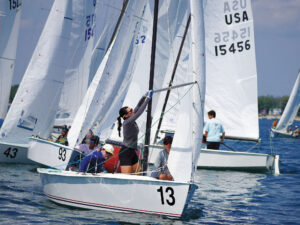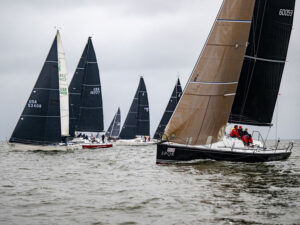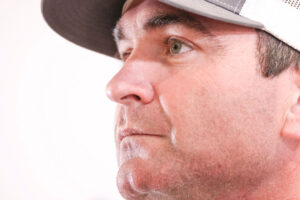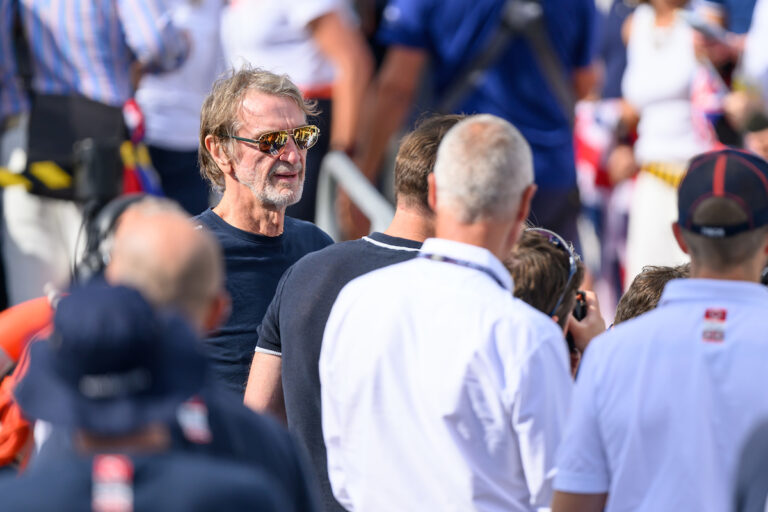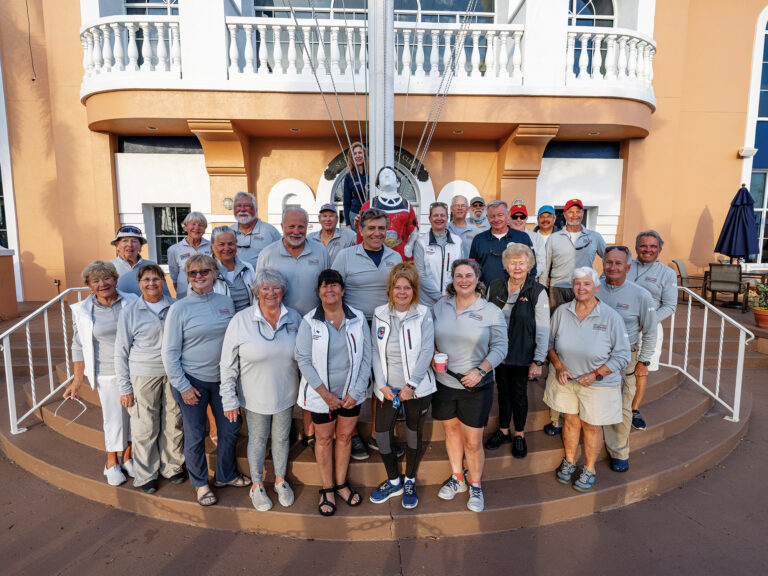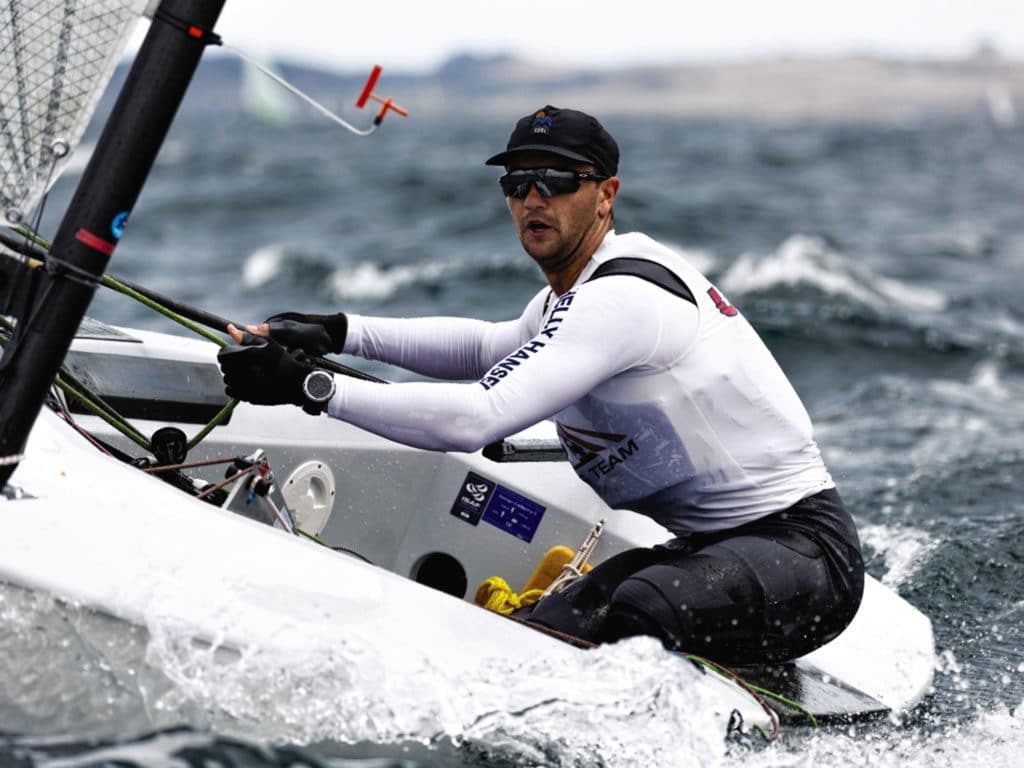
It’s a hot late afternoon at the Houston YC, and the sea breeze that kicked in earlier in the afternoon is winding down. At the boat ramp, two Finns have just been hosed off and are being put away for the day when a nondescript, silver Toyota Tundra pickup truck pulls in and stops a short distance away. One sailor, still in his kit from the afternoon training session, walks to the pickup truck and holds his cellphone to the truck window. The driver does the same on the opposite side.
It’s not a high-tech drug deal, but rather an airdrop that exchanges a file over a Bluetooth connection. The driver, Luther Carpenter, is the US Olympic Finn coach, and the sailor is Luke Muller, who has just been named the US Finn representative for the 2021 Olympic Games in Tokyo. Carpenter is transferring video of the day’s training session, which Muller, along with his training partner, Eric Anderson, will pore over after dinner until it’s time to call it a day. It’s all part of the new normal for Olympic training—no traveling, lots of training at one venue, and an intentionally over-the-top focus on health that includes keeping one’s distance from others, even the coach.
The challenge adds an additional layer to an already complex program of preparedness for what is arguably one of the pinnacles of the sport, but one Muller and team fully embrace. It’s part of a trajectory he’s been on since establishing himself in the Laser class, winning the 2013 US Nationals at the ripe old age of 17. As the 6-foot-3-inch teenager got bigger, it was a natural progression to the Finn. “He started showing up at European championships,” Carpenter recalls. “He was somehow finding a boat—not the best boat, didn’t have the best mast, had a borrowed sail—and was just doing it.”
RELATED: Detours To Tokyo
He joined the US Sailing Squad in 2014 at age 18 and became a member of the US Sailing team two years later, while attending Stanford, where he captained the sailing team for the 2016 to 2017 academic year. But the goal, maybe unspoken, always quivered on the horizon. “I have friends and family who say, ‘Oh, you always wanted to go to the Olympics,’” Muller says. “I always wanted to, but I never believed I could until much later.”
He got his first taste of the Olympics when Carpenter brought him to Rio to train with Caleb Paine in preparation for the 2016 Games. “We got him some good gear to use,” Carpenter says. “That was very encouraging for him.”
Paine would go on to win a bronze medal and took the next year off. Carpenter, meanwhile, traveled with Muller on the Finn circuit. “I wanted to get a good sense for what he was good at and what kind of work we still needed to focus on,” Carpenter says.
Paine returned the following year, and the two of them worked as training partners. “It was the veteran bronze medalist trying to impart his wisdom to the young pup,” Carpenter says. “And of course, when the young pup threatened him a bit, it unnerved him a little.”
But still, all eyes were on Paine.
On the second day of the 2018 Sailing World Championships in Denmark, 22-year-old Muller revealed a glimmer of his potential, winning two of three races in very difficult conditions. Carpenter recalls: “The entire Finn world opened their eyes and asked, ‘What’s going on here?’ It’s not an easy class to go out there and win any given world championship race, and winning two in a row on a tricky day was huge.”
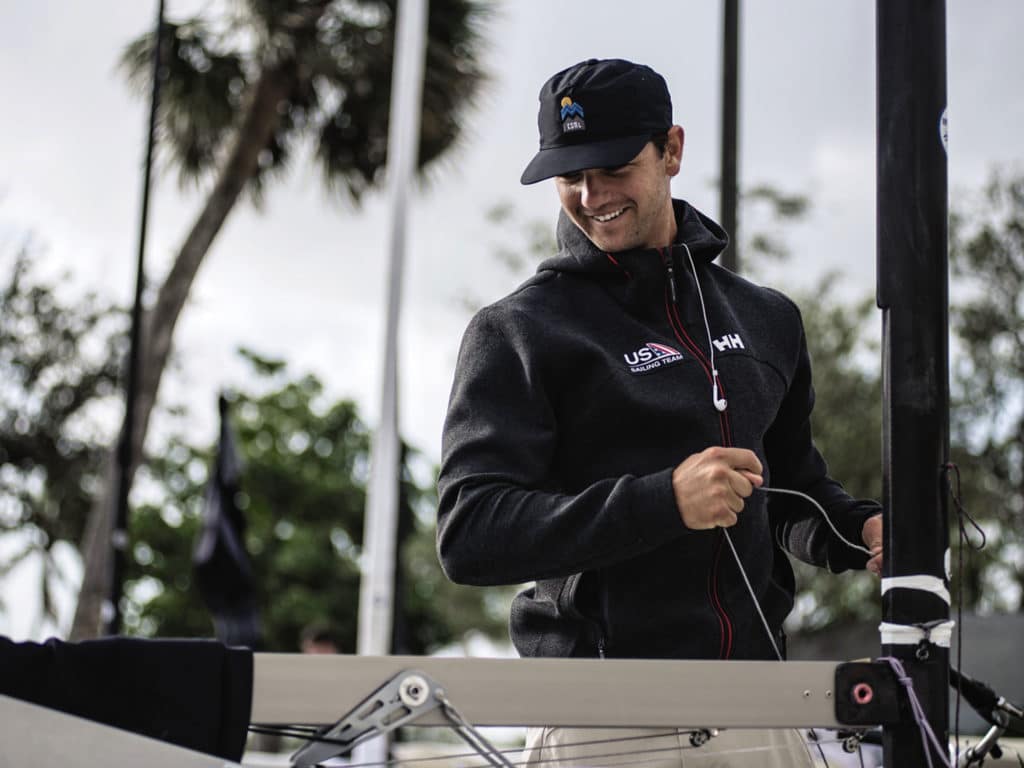
Muller says, “I got a lot of kudos from the fleet that day, but my good fortune didn’t last, and I struggled for the rest of the event.” Muller barely finished in the top third of the fleet; Paine was 12th.
“That was when I decided to leave school because I knew that if I dedicated all my effort into sailing the Finn, I had a chance of becoming world-class,” Muller says.
Why the success in those two races? Says Carpenter: “The Finn is a free-pumping class, and in those races, the wind was a very fragile 10 knots, so it was a ton of work, but not real obvious about how to pump most efficiently to get down the waves. And Luke just had one of those days where he really had the angles and technique figured out. In both races, he came from behind to win on the runs.”
As the Finn circuit continued, Muller’s results improved. “I started beating [Paine] in a series of events, and I started believing I could make it to the Games. I wasn’t focused on him, per se, but things were going my way.”
“I just wanted to improve. It wasn’t all about qualifying for the Olympics or getting a certain race result or ranking. It was about improving and consistently being at the top of the fleet.”
The events to which he refers determine the US Finn representative to the 2020, now 2021, Games: the 2019 Finn World Cup in Melbourne, Australia, the Hempel World Cup Series in Miami, and the 2020 Finn Gold Cup. In the 2019 Gold Cup, Muller finished 17th to Paine’s 25th. In Miami, Paine finished first, with Muller third, leaving Muller still ahead in Trials points. And when the pandemic forced the cancellation of the 2020 Gold Cup, that was it—Muller was going to Tokyo.
“I didn’t think it was likely I could go to the Games until I was leading on points,” he says. “It was a good feeling, and gratifying that all the hard work was paying off. At the same time, I just wanted to improve. It wasn’t all about qualifying for the Olympics or getting a certain race result or ranking. It was about improving and consistently being at the top of the fleet.”
Now Muller, Anderson and Carpenter’s world is circumscribed by Galveston Bay. “We’ve been in Houston because Luther lives here, and it was fine when we arrived. But when it deteriorated, we tightened up,” Muller says. “We were living with family and friends, and though we were super grateful to be with them, it just wasn’t a situation we could control, so Eric and I moved into our own place.”
On the water, they carry their own drinks and food, and when they talk with Carpenter, in the coach’s boat, it’s from a distance. “When campaigning, we get to see so many different local cultures all over the world, and things are a little different now,” Muller says. “We cook a lot more at home, and I’ve learned how to make a darn good cup of coffee.”
But there’s a lemonade-from-lemons element to their situation: Without practice time eaten up by long flights, they can focus entirely on time in the boat. “We are sailing much more consistently and for longer blocks without rest than we normally would,” Muller says.
Carpenter says it allows them to better progress on specifics. “Things we know we need to work on,” he says, “like how to steer around a patch of bad waves or how to keep the angle of the bow into a difficult wave set of three, and so on.”
The fact that there will be no “next” Olympics for the Finn is a lingering reality, but one they’ve learned to accept. “On the one hand, it’s disappointing,” Carpenter says, “but on the other, it gives a real sense of urgency to our work. You can’t have the mindset of, ‘Well, I might not get there in the first quad, but hopefully I’ll get there in the next.’ You can’t say, ‘I can work on this tomorrow.’”
For Muller, it’s an opportunity. “I want to represent the US sailing community really well, and the fact that this is the last time the Finn is in the Games makes that responsibility even greater.”

